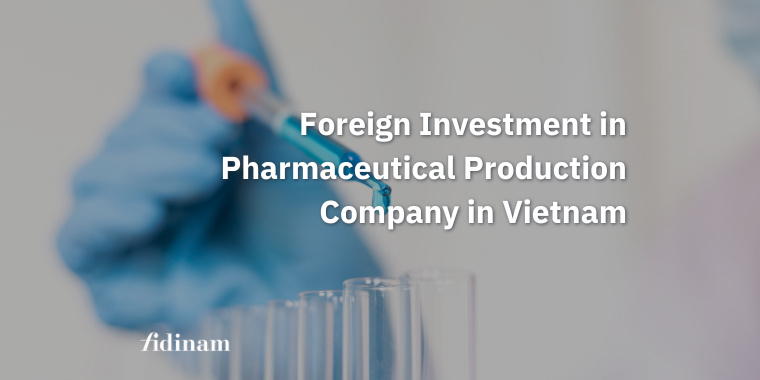
Vietnam is an attractive market for pharmaceutical production because of the high demand for these products and the current dependence on imported pharmaceutical products.
In October 2023, the Prime Minister issued Decision No. 1165/QD-TTg, approving a strategy to develop Vietnam’s pharmaceutical industry to 2030, with a vision to 2045, aiming to match the standards of advanced regional countries and boost domestic drug and herbal ingredient production.
Additionally, the Ministry of Health has released a draft Law Amending the Law on Pharmacy, offering numerous incentives to further develop the industry.
In Vietnam, foreign-invested enterprises can import drugs and medicinal ingredients but cannot distribute them or engage in related activities. One recommended strategy to enter the market is to establish a manufacturing company, which can distribute its own produced drugs and medicinal ingredients in Vietnam.
Yes, currently Vietnam allows foreign investors to incorporate 100% foreign-owned companies in pharmaceutical production.
To set up a foreign-owned company (i.e. 100% foreign-owned company or joint-venture company) (“VN Co”), the investors need to conduct the following steps:
The term of an IRC can be up to 50 years.
There is no term for the ERC.
The company is legally established on the date of the ERC.
In addition to IRC and ERC, the company in Vietnam is required to perform and obtain the following licenses/certificates: 1) Certificate of eligibility for pharmaceutical business and Pharmacy Practice Certificates, 2) Circulation Registration Certificate, 3) Fire prevention and fighting, 4) Environmental protection.
Conditions for issuance of Certificate of eligibility for pharmaceutical business are:
For distribution of the products that the company manufactured in Vietnam, the company also needs to satisfy other conditions of the infrastructure, equipment, and personnel applied such as having the premises, a storage area, storage equipment, technical documents, transportation, etc. to obtain the Certificate of eligibility for the pharmaceutical business.
Drugs and medicinal ingredients must be registered before being circulated in Vietnam.
Depending on the scale, business area, and volume, the pharmaceutical factories need to comply with the regulations on fire prevention and fighting and must ensure the safety conditions for fire prevention and fighting, including the Certificate of design appraisal for fire prevention and fighting the fire.
Depending on the scale of projection and the generation of hazardous waste during the production, the company needs to carry out Environment License/Environmental Registration/Environment Impact Assessment before the incorporation process/official operation.
The Vietnamese government offers numerous investment-related business incentives to retain the country’s appeal to international investors, and it continually enhances its offerings through reforms and upgrades.
There are 4 forms of incentives that are available to investment projects within Vietnam as follows:
According to the laws of Vietnam, Pharmaceutical Production is a business line eligible for investment incentives under the Law on Investment 2020. The enterprises doing a production from the implementation of the new investment projects in Economic Zones, Hi-Tech Parks are entitled to enjoy:
In addition, the draft of Law Amending the Law on Pharmacy released by the Ministry of Health, promises to provide many attractive incentives for boosting the development of the pharmaceutical industry.
Accordingly, the new law which is scheduled to come into force in 2025, provides attractive content such as incentives for investment in drug manufacturing technology transfer, marketing authorization of drugs and medicinal ingredients, management of drug price, drug import and export, and pharmaceutical business of foreign-invested enterprises in Vietnam.
The draft law proposes various types of incentives for various activities, including:
The draft law also adds a new clause that encourages foreign investment in Vietnam’s pharmaceutical industry specifically: “Encourage research and production, receive technology transfer and attract foreign investment in the production of medicinal raw materials, the production of new drugs, original brand-name drugs, specialized drugs, biological drugs, national brand pharmaceuticals, and raw materials for drug production”
Under some relevant FTAs with Vietnam, pharmaceutical products exported from Vietnam can enjoy the benefit of reduction or elimination of customs duties.
The Vietnam - EU Free Trade Agreement (EVFTA) officially took effect on 1 August 2020. The EU has eliminated import taxes since the effective date of EVFTA for the pharmaceutical products belonging to Chapter 30 of the Tariff Schedule of the Union exported from Vietnam.
For the Asian region, following the ASEAN-China Free Trade Area (ACFTA) between the Member States of the Association of Southeast Asian Nations (“ASEAN”, comprising Brunei, Cambodia, Indonesia, Laos, Malaysia, Myanmar, Philippines, Singapore, Thailand, and Vietnam) and China, China committed on the reduction or elimination of customs duties for various products imported from Vietnam.
From 2018, import taxes for all the pharmaceutical products regulated in the ACFTA Tariff Reduction Schedule- China exported from Vietnam to China exported from ASEAN have been eliminated to 0%.
With Vietnam’s strategic trade agreements, robust infrastructure, and skilled workforce, the country provides an optimal environment for global brands seeking to enhance their production capabilities and expand their reach.
To explore how you can benefit from this opportunity and successfully set up your pharmaceutical production in Vietnam, contact Fidinam Vietnam today for comprehensive support and guidance throughout the process.
Contact us via the form below or at info@fidinam.com.vn.
All content © . All Rights Reserved.